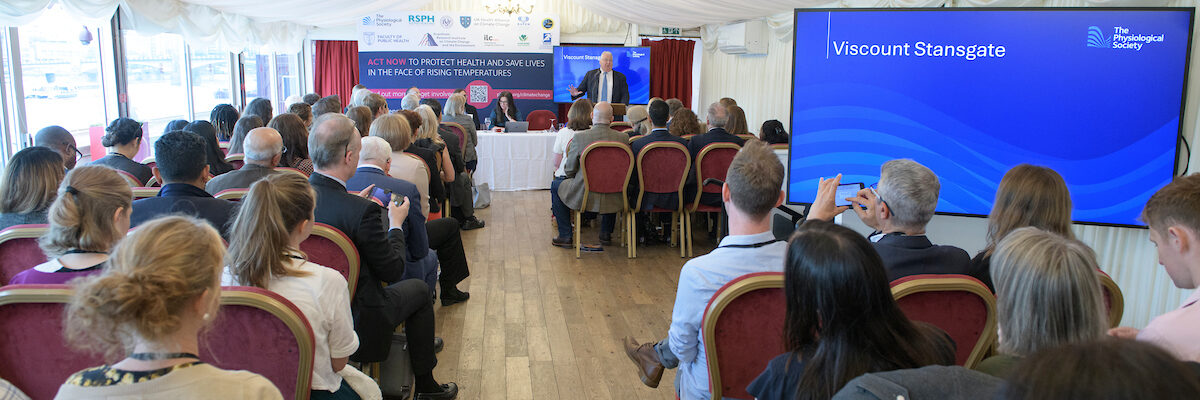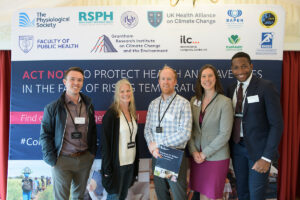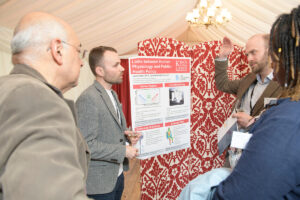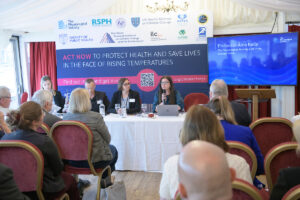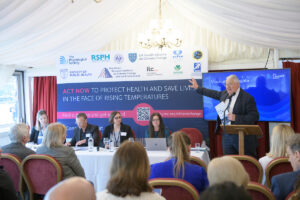Last week, 150 people from across the health and science sectors came together in Parliament to call for immediate, coordinated action to reduce the projected rise in deaths and health issues due to increasing temperatures.
The event, held in the Houses of Parliament on 12 June, launched a consensus statement ‘Roadmap for Global Heat Resilience’. This statement, coordinated by The Physiological Society and backed by numerous health and science organisations, urges leaders across the world to adopt a human centred approach to tackling the health threat of climate change by coordinating efforts across sectors to improve preparedness to heat, with an emphasis on vulnerable populations. The event was split into two parts, a panel discussion and a networking lunch with ‘research booths’ showcasing the research being done at the climate and health nexus.
Join fellow organisations and sign the consensus statement
Join the Climate & Physiological Resilience Network
Three takeaways from the panel discussion:
- Collaboration will be key Only by working in an transdisciplinary way and by bringing together people from across diverse fields such as health, policy, physiology, building design, engineering and more can we fully tackle the challenges of extreme heat and protect the most vulnerable.
- It is vital that both physical and mental health are considered in the discussion around the impact of rising temperatures on the human body. There is still a lot that we don’t know about the link between heat and mental health and much to do in this area.
- Physiology is uniquely placed to help solve the multifaceted problem that is the impact of rising temperatures on human health because physiology intersects many fields and provides a human-centred approach and a focus on mechanisms.
Thank you to all of our panel speakers: Catherine Sebastian (Wellcome Trust), Dr Candice Howarth (Grantham Research Institute on Climate Change and the Environment), Professor Damian Bailey (University of South Wales & The Physiological Society), our panel chair Professor Áine Kelly (Trinity College Dublin & The Physiological Society) and our host, Stephen Benn, Viscount Stansgate.
Climate change and health
Climate change is the greatest health threat facing humanity. Globally, extreme temperature events are observed to be increasing in their frequency, duration, and magnitude. Between 2000 and 2016, the number of people exposed to heatwaves increased by around 125 million, and the ten most recent years are the warmest on Earth on record. As temperatures rise, so too do the number of preventable heat-related deaths. The World Health Organization estimate that between 2030 and 2050, climate change will cause approximately 250 000 additional deaths per year, from undernutrition, malaria, diarrhoea and heat stress alone. In the UK, we have seen record-breaking temperatures, with the Met Office issuing its first ‘red warning’ for extreme heat and the Government declaring a national emergency in 2022 when temperatures reached over 40°C. During that summer alone, there were an estimated 2,985 excess deaths associated with five heat episodes in England, the highest number in any given year.
Everyone is at risk, particularly those with reduced ability to cope with extreme heat, such as people who are older, pregnant, or those living or working in high-exposure environments. The UK Government needs to act now to build long-term heat resilience plans focused on prevention and preparation to protect health and save lives nationally as well as supporting international action.
Roadmap to Global Heat Health
The Roadmap to Global Heat Health sets out six priorities to mitigate the health impacts of rising temperatures and contribute towards a resilient and thriving future for all communities:
- Prevention and preparation: Focus on medium- and long-term strategies for the whole population, with a specific focus on vulnerable populations.
- Coordinated efforts: Align heat-related activities at all government levels with clear accountability.
- Societal engagement: Engage public, private, and voluntary sectors in resilience measures.
- Targeted Heat Action Plans: Use vulnerability assessments to focus efforts on those most at risk.
- Enhanced collaboration: Foster cooperation across countries, sectors, and scientific disciplines, incorporating transdisciplinary approaches.
- Future prosperity and sustainability: Promote sustainability and productivity for a brighter, prosperous and secure future.
Find out more and get involved
